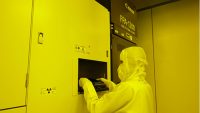Canon Litho Breakthrough May Advance Global Chipmaking
October 19, 2023
Canon has made a breakthrough it says can help manufacture the world’s most advanced semiconductors. The company’s latest nanoimprint lithography (NIL) system challenges Dutch firm ASML, to date the leader in extreme ultraviolet (EUV) lithography technology. ASML creates tech used in TSMC’s chips made for Apple iPhones. Canon says its FPA-1200NZ2C nanoimprint semiconductor manufacturing equipment can produce chips equivalent to a 5-nanometer process, the current state of the art, and with further improvement expects to enable circuit patterning corresponds to 2nm nodes. The new equipment is also energy efficient, Canon says.
Headquartered in Japan, Canon’s traditional business of manufacturing cameras, optical equipment and printers has resulted in a focus on semiconductors at a time when the global market is highly competitive. “Both TSMC and South Korea’s Samsung, the two biggest advanced chip manufacturing companies, are aiming to make 2nm chips in 2025,” CNBC reports.

Nanoimprint lithography machines “print the design of a chip onto the material that ends up going into the semiconductor,” CNBC explains. The nanoimprint lithography process is a high-resolution patterning process that can etch very fine features onto circuit boards.
“In contrast to conventional photolithography equipment, which transfers a circuit pattern by projecting it onto the resist coated wafer,” the new Canon product “does it by pressing a mask imprinted with the circuit pattern on the resist on the wafer like a stamp,” the company says in a press release.
“Because its circuit pattern transfer process does not go through an optical mechanism, fine circuit patterns on the mask can be faithfully reproduced on the wafer. Thus, complex two- or three-dimensional circuit patterns can be formed in a single imprint, which may reduce the cost,” Canon adds.
Because Canon’s NIL machines do not require special wavelength light — like ASML’s, which require extreme ultraviolet — they reduce power consumption. Canon has been developing its NIL technology since 2004 and now appears ready to commercialize it.
“Like domestic peer Nikon Corp., Canon has fallen far behind ASML in the EUV race, but its nanoimprint lithography approach may help it close the gap,” writes Bloomberg.
NIL machines “have been dragged into the battle over technology between the U.S. and China,” CNBC says, with Bloomberg adding that it may “add a new front” in the trade war, “as the import of EUV machines — so far the only reliable method for fabricating 5nm chips and smaller — into China is prohibited by trade sanctions.”

No Comments Yet
You can be the first to comment!
Leave a comment
You must be logged in to post a comment.